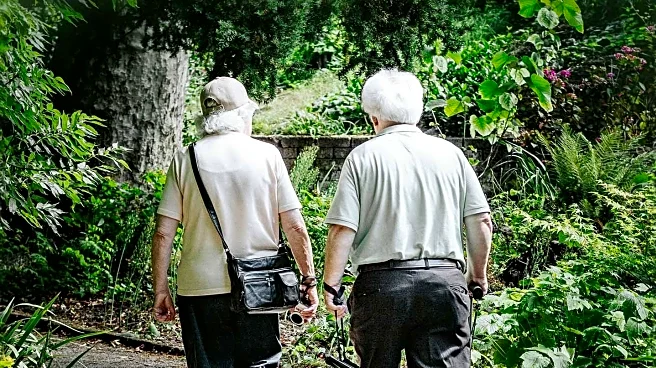What is the story about?
What's Happening?
Recent studies have highlighted the health benefits of hobbies traditionally favored by the baby boomer generation, such as walking and gardening. These activities, once considered simple pastimes, are now recognized for their significant contributions to healthy aging. Walking, for instance, has been shown to improve cardiovascular health, support bone density, and enhance memory. A 2022 genetic study involving over 400,000 participants found that brisk walking could slow biological aging by up to 16 years. Similarly, gardening is linked to lower stress levels, improved immune function, and a reduced risk of dementia. These findings suggest that the everyday activities boomers engaged in are not only sustainable but also beneficial for long-term health.
Why It's Important?
The recognition of these hobbies as beneficial for longevity underscores a shift in understanding the importance of simple, accessible activities in promoting health. As healthcare costs rise and the population ages, these findings could influence public health strategies by encouraging low-cost, sustainable activities that improve quality of life. Walking and gardening require minimal resources, making them accessible to a wide demographic, including those with limited access to fitness facilities. This could lead to broader societal benefits, such as reduced healthcare costs and improved mental health outcomes, as more people adopt these practices.
What's Next?
As awareness of these benefits grows, there may be increased advocacy for urban planning that supports walking and community gardening. This could include the development of more pedestrian-friendly areas and public gardens. Additionally, healthcare providers might begin to recommend these activities as part of preventive health measures. Community programs could also emerge, promoting these hobbies as a means to enhance social connections and physical health among older adults.
Beyond the Headlines
The emphasis on these traditional hobbies highlights a cultural shift towards valuing simplicity and sustainability in lifestyle choices. This could lead to a reevaluation of modern, high-tech fitness trends, with a renewed focus on activities that integrate seamlessly into daily life. Furthermore, the social aspects of these hobbies, such as community gardening and group walks, could foster stronger community ties and combat social isolation, particularly among the elderly.















